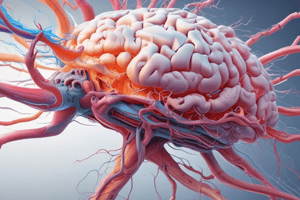Podcast
Questions and Answers
Which bone is located near the frontal lobe?
Which bone is located near the frontal lobe?
- Occipital bone
- Frontal bone (correct)
- Parietal bone
- Temporal bone
The cerebellum is near the temporal bone.
The cerebellum is near the temporal bone.
False (B)
What is the role of the spinal cord in the central nervous system?
What is the role of the spinal cord in the central nervous system?
The spinal cord transmits signals between the brain and the rest of the body.
Which arteries primarily supply the internal capsule with blood?
Which arteries primarily supply the internal capsule with blood?
The brainstem lies close to the _____ bone.
The brainstem lies close to the _____ bone.
Match the following components with their corresponding areas:
Match the following components with their corresponding areas:
Lipohyalinosis is characterized by the accumulation of a lipid substance within the vessel wall.
Lipohyalinosis is characterized by the accumulation of a lipid substance within the vessel wall.
What types of pathways does the internal capsule connect?
What types of pathways does the internal capsule connect?
The internal capsule is primarily composed of ______ matter.
The internal capsule is primarily composed of ______ matter.
Match the following components of the nervous system with their functions:
Match the following components of the nervous system with their functions:
Study Notes
Internal Capsule
- Composed of white matter with ascending and descending fiber tracts connecting cerebral hemispheres to subcortical structures, brainstem, and spinal cord.
- Receives vascular supply from anterior cerebral, middle cerebral, anterior choroidal, and internal carotid arteries.
- Perforating arteries supplying the internal capsule are susceptible to lipohyalinosis, leading to ischemic damage.
- Ischemic damage can manifest as significant motor and sensory deficits.
Lipohyalinosis
- Refers to degenerative changes in small blood vessels characterized by a lipid accumulation in vessel walls.
- Linked to conditions like hypertension and atherosclerosis, increasing the risk of small brain infarcts.
Neuroanatomy of the Skull
- Frontal lobe is adjacent to the frontal bone.
- Temporal lobe lies close to the temporal bone.
- Cerebellum is associated with the occipital bone.
- Brainstem is also near the occipital bone.
- Spinal cord emerges from the C1 vertebra.
Peripheral Nervous System (PNS) Structures
- Dorsal root: Carries sensory information to the spinal cord.
- Dorsal root ganglion: Contains sensory neuron cell bodies.
- Dorsal horn of grey matter: Processes incoming sensory information.
- Ventral horn of grey matter: Contains motor neurons that send signals to muscles.
- Intermediate zone of grey matter: Houses inter-neurons for local processing.
- Ventral roots: Carry motor signals away from the spinal cord.
- Spinal cord white matter: Comprises ascending and descending nerve tracts.
- Spinal nerves: Mixed nerves containing both sensory and motor fibers.
- Dorsal primary ramus: Branch of the spinal nerve that innervates the back.
- Ventral primary ramus: Branch of the spinal nerve that innervates the front and limbs.
Cervical Region of the Spinal Cord
- The cervical region includes eight spinal nerves (C1-C8) despite having only seven vertebrae.
- Intervertebral foramina are openings in the vertebral column through which C1-C8 spinal nerves travel.
Studying That Suits You
Use AI to generate personalized quizzes and flashcards to suit your learning preferences.
Related Documents
Description
Explore the fundamental structures of the nervous system in this engaging workshop. This quiz will test your knowledge of basic neuroanatomy and cerebrospinal fluid functions. Enhance your understanding and retention of important concepts related to the nervous system.




